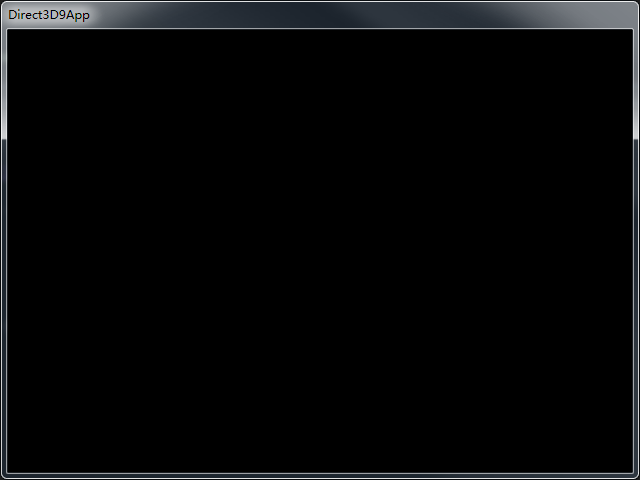Dx9 样例运行
参考链接:https://blog.csdn.net/sinat_24998369/article/details/78941477
关于vs2017 配置和运行龙书DX9样例
配置环境:
- 下载DXSDK_Jun10.exe,安装后会有一个文件夹:Microsoft DirectX SDK (June 2010)(我的默认路径是C:\Program Files (x86)\Microsoft DirectX SDK (June 2010))
- 打开vs2017,Visual C++ 新建新项目,如图:
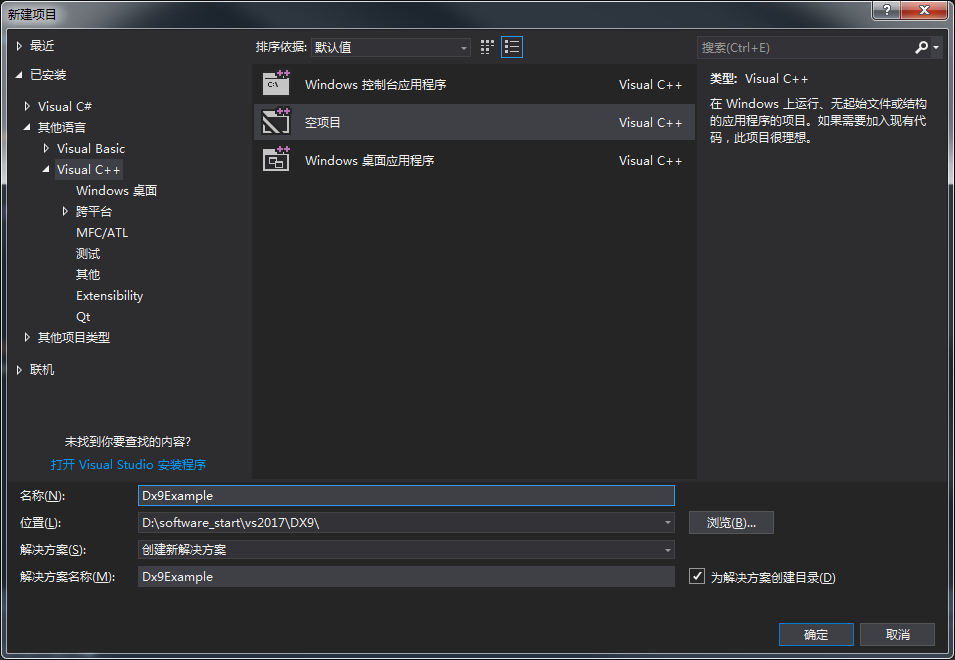
- 创建项目完成后,右键项目选择属性。
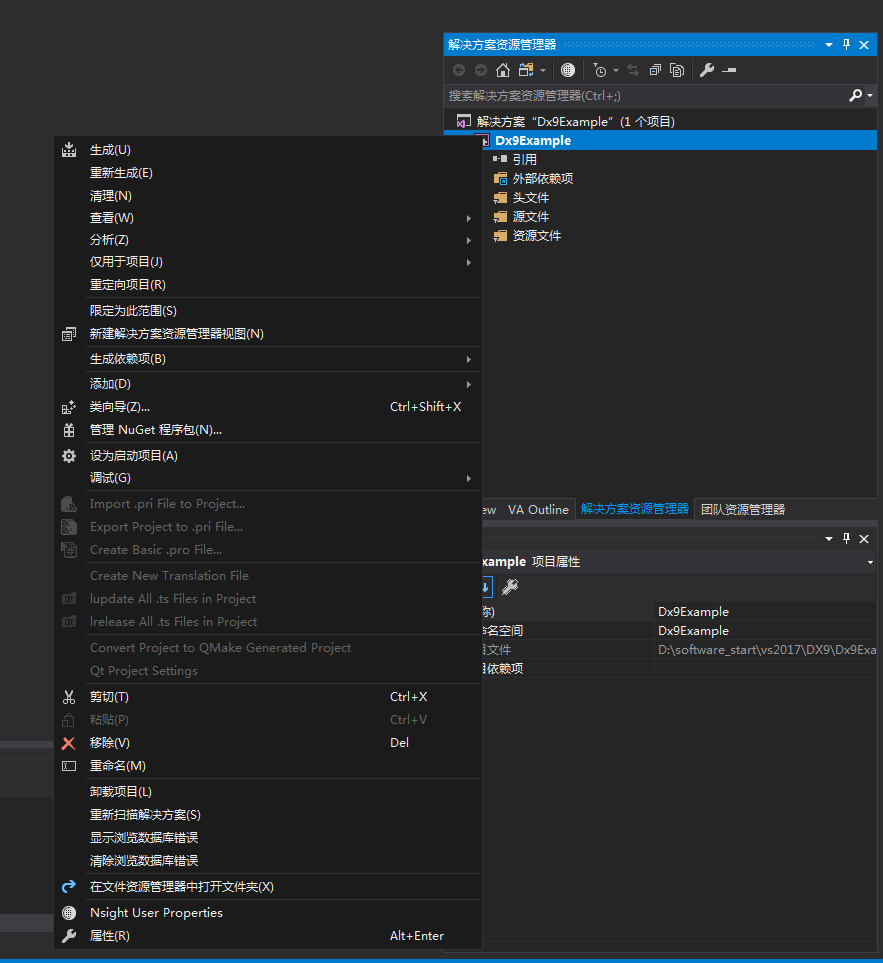
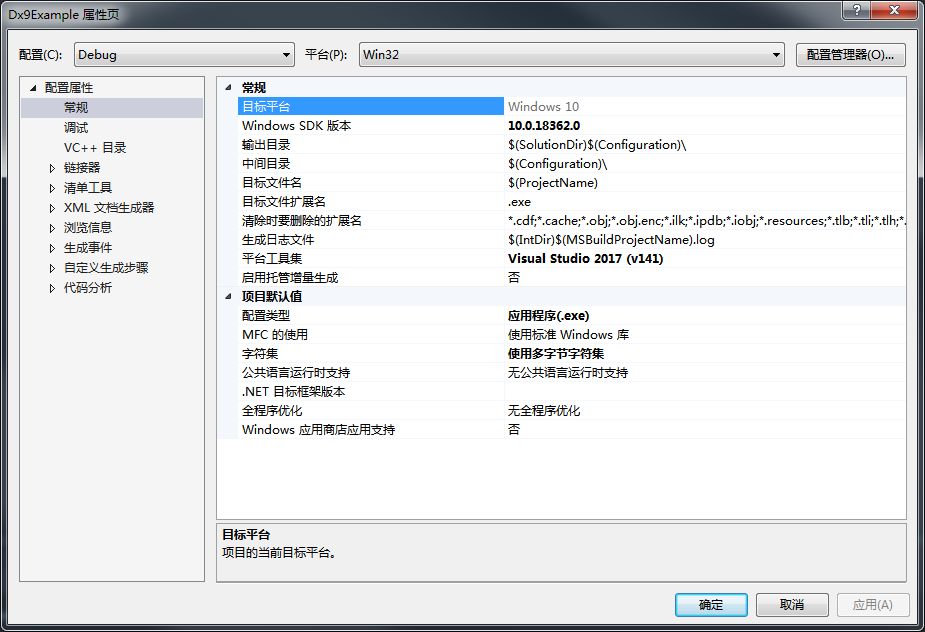
- 点击VC++目录,在包含目录选择编辑导入包含目录,我的路径是(C:\Program Files (x86)\Microsoft DirectX SDK (June 2010)\Include)
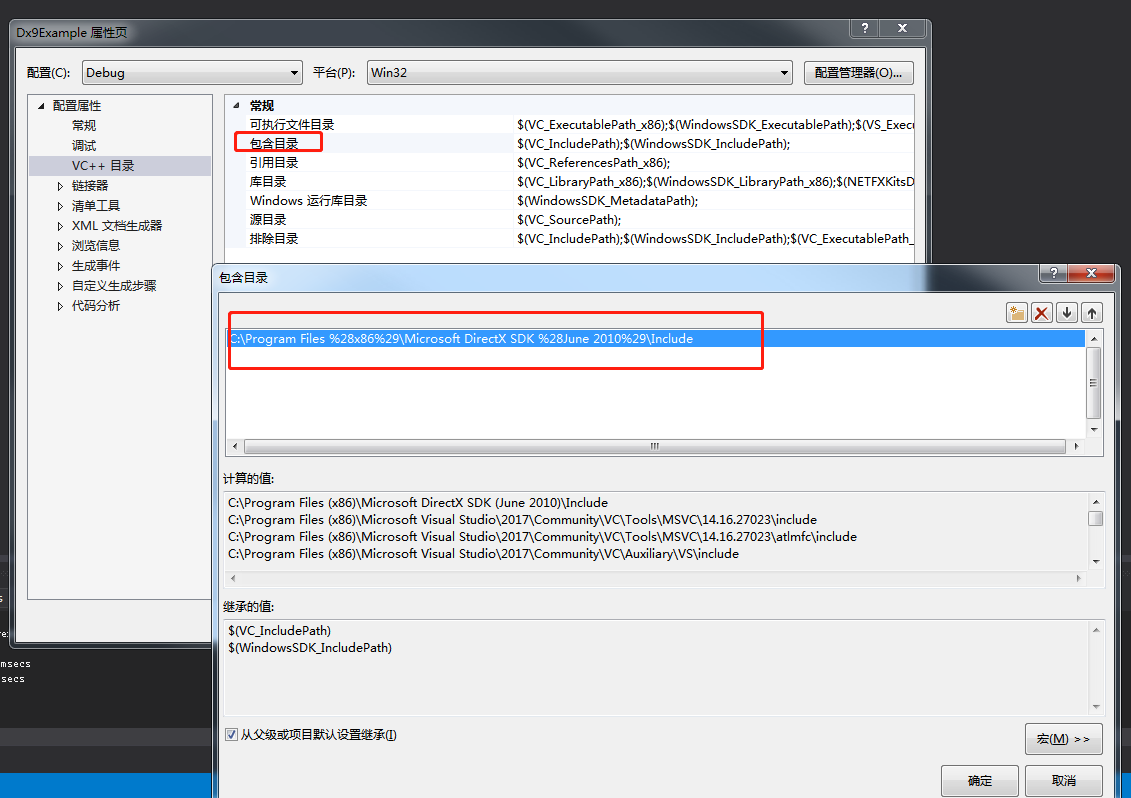
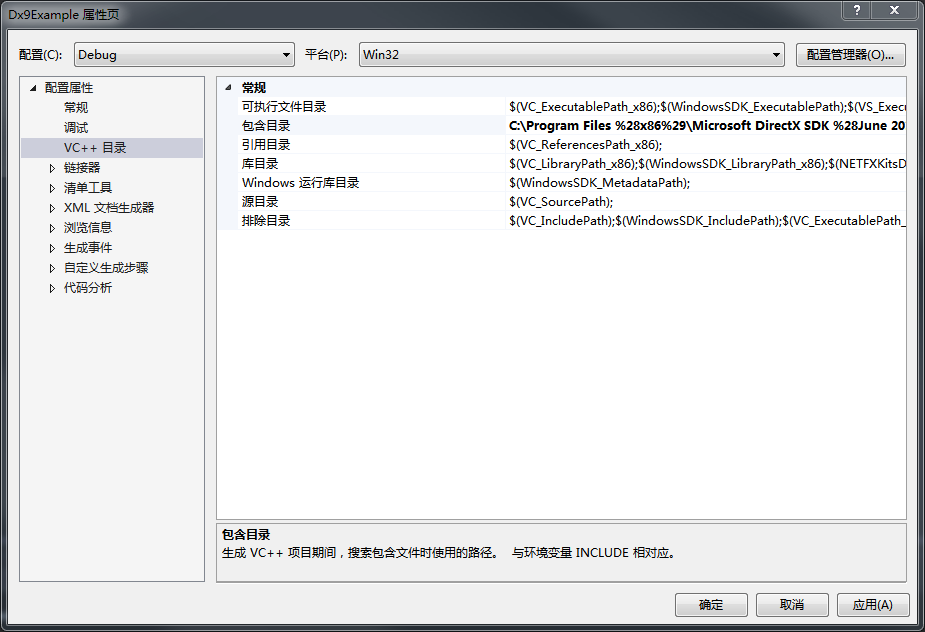
然后选择库目录,导入目录,我的目录是(C:\Program Files (x86)\Microsoft DirectX SDK (June 2010)\Lib\x86)
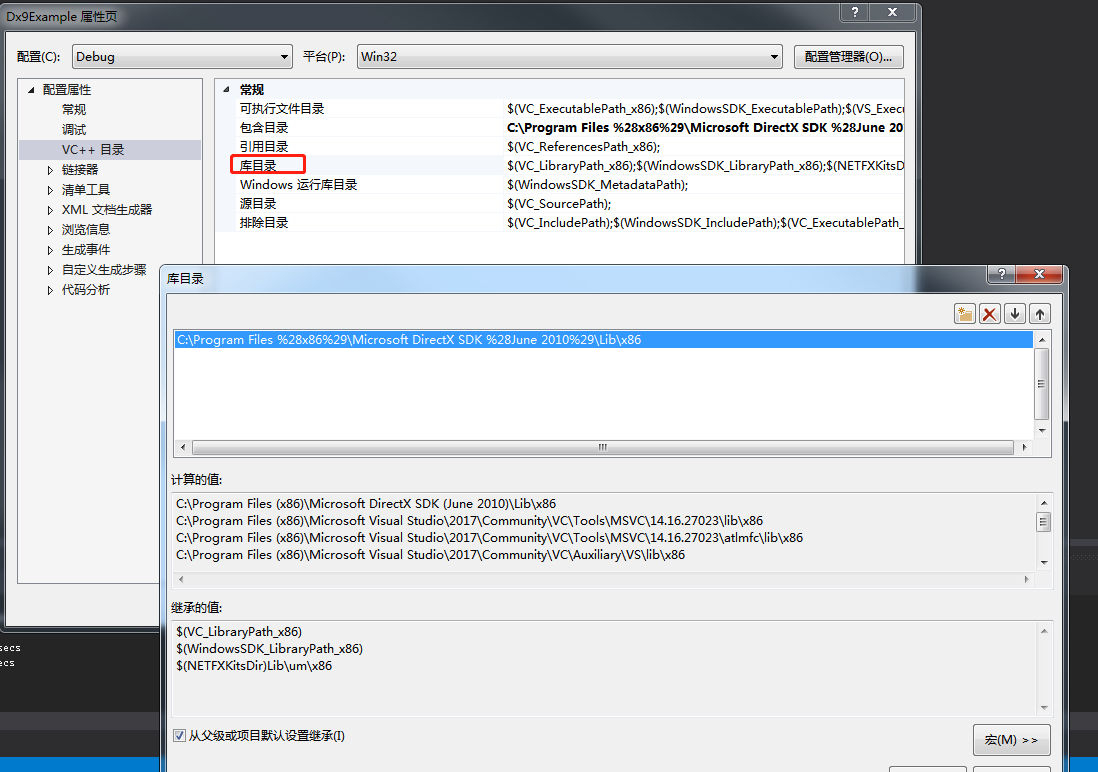
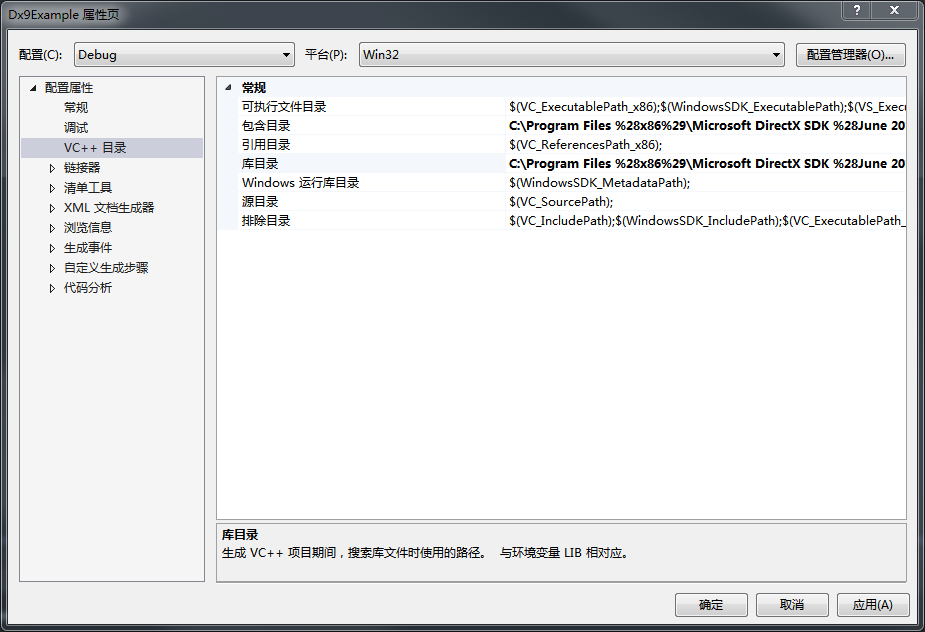
- 在"链接器"的"输入"中的"附加依赖项"编辑,输入 d3d9.lib d3dx9.lib winmm.lib
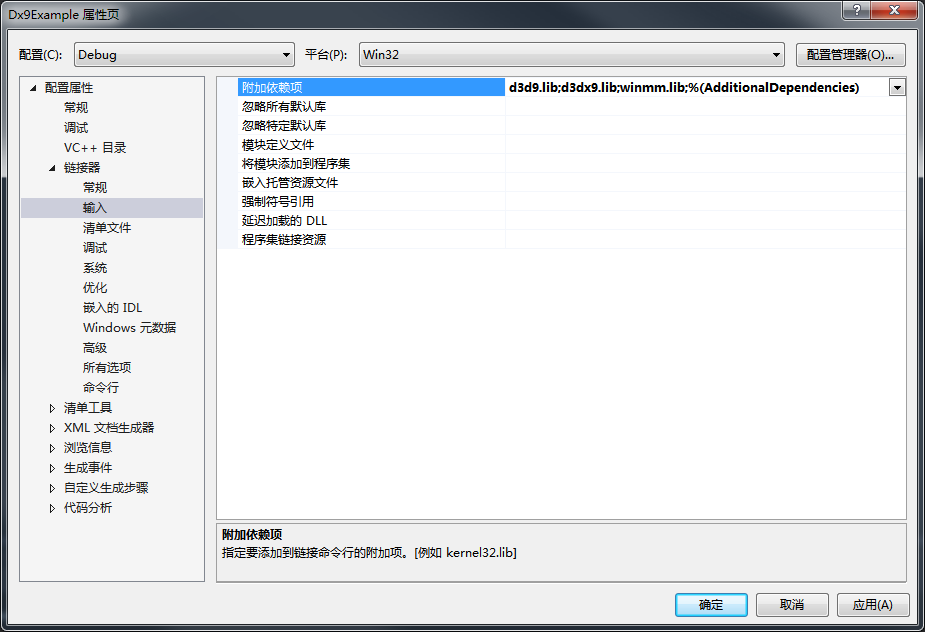
- 点击应用 确定后,环境已经配置完成了,下面开始运行案例。
(源码下载链接:https://pan.baidu.com/s/1cwdJSEu0X6sH0t4wW3vP8w ,密码:m7k2,这里运行的是第一张的案例)
d3dutility.h:
#ifndef __d3dUtilityH__
#define __d3dUtilityH__
#include <d3dx9.h>
#include <string>
namespace d3d
{
bool InitD3D(
HINSTANCE hInstance, // [in] Application instance.
int width, int height, // [in] Backbuffer dimensions.
bool windowed, // [in] Windowed (true)or full screen (false).
D3DDEVTYPE deviceType, // [in] HAL or REF
IDirect3DDevice9** device);// [out]The created device.
int EnterMsgLoop(
bool (*ptr_display)(float timeDelta));
LRESULT CALLBACK WndProc(
HWND hwnd,
UINT msg,
WPARAM wParam,
LPARAM lParam);
template<class T> void Release(T t)
{
if( t )
{
t->Release();
t = 0;
}
}
template<class T> void Delete(T t)
{
if( t )
{
delete t;
t = 0;
}
}
}
#endif // __d3dUtilityH__
d3dUtility.cpp
#include "d3dUtility.h"
bool d3d::InitD3D(
HINSTANCE hInstance,
int width, int height,
bool windowed,
D3DDEVTYPE deviceType,
IDirect3DDevice9** device)
{
//
// Create the main application window.
//
WNDCLASS wc;
wc.style = CS_HREDRAW | CS_VREDRAW;
wc.lpfnWndProc = (WNDPROC)d3d::WndProc;
wc.cbClsExtra = 0;
wc.cbWndExtra = 0;
wc.hInstance = hInstance;
wc.hIcon = LoadIcon(0, IDI_APPLICATION);
wc.hCursor = LoadCursor(0, IDC_ARROW);
wc.hbrBackground = (HBRUSH)GetStockObject(WHITE_BRUSH);
wc.lpszMenuName = 0;
wc.lpszClassName = "Direct3D9App";
if( !RegisterClass(&wc) )
{
::MessageBox(0, "RegisterClass() - FAILED", 0, 0);
return false;
}
HWND hwnd = 0;
hwnd = ::CreateWindow("Direct3D9App", "Direct3D9App",
WS_EX_TOPMOST,
0, 0, width, height,
0 /*parent hwnd*/, 0 /* menu */, hInstance, 0 /*extra*/);
if( !hwnd )
{
::MessageBox(0, "CreateWindow() - FAILED", 0, 0);
return false;
}
::ShowWindow(hwnd, SW_SHOW);
::UpdateWindow(hwnd);
//
// Init D3D:
//
HRESULT hr = 0;
// Step 1: Create the IDirect3D9 object.
IDirect3D9* d3d9 = 0;
d3d9 = Direct3DCreate9(D3D_SDK_VERSION);
if( !d3d9 )
{
::MessageBox(0, "Direct3DCreate9() - FAILED", 0, 0);
return false;
}
// Step 2: Check for hardware vp.
D3DCAPS9 caps;
d3d9->GetDeviceCaps(D3DADAPTER_DEFAULT, deviceType, &caps);
int vp = 0;
if( caps.DevCaps & D3DDEVCAPS_HWTRANSFORMANDLIGHT )
vp = D3DCREATE_HARDWARE_VERTEXPROCESSING;
else
vp = D3DCREATE_SOFTWARE_VERTEXPROCESSING;
// Step 3: Fill out the D3DPRESENT_PARAMETERS structure.
D3DPRESENT_PARAMETERS d3dpp;
d3dpp.BackBufferWidth = width;
d3dpp.BackBufferHeight = height;
d3dpp.BackBufferFormat = D3DFMT_A8R8G8B8;
d3dpp.BackBufferCount = 1;
d3dpp.MultiSampleType = D3DMULTISAMPLE_NONE;
d3dpp.MultiSampleQuality = 0;
d3dpp.SwapEffect = D3DSWAPEFFECT_DISCARD;
d3dpp.hDeviceWindow = hwnd;
d3dpp.Windowed = windowed;
d3dpp.EnableAutoDepthStencil = true;
d3dpp.AutoDepthStencilFormat = D3DFMT_D24S8;
d3dpp.Flags = 0;
d3dpp.FullScreen_RefreshRateInHz = D3DPRESENT_RATE_DEFAULT;
d3dpp.PresentationInterval = D3DPRESENT_INTERVAL_IMMEDIATE;
// Step 4: Create the device.
hr = d3d9->CreateDevice(
D3DADAPTER_DEFAULT, // primary adapter
deviceType, // device type
hwnd, // window associated with device
vp, // vertex processing
&d3dpp, // present parameters
device); // return created device
if( FAILED(hr) )
{
// try again using a 16-bit depth buffer
d3dpp.AutoDepthStencilFormat = D3DFMT_D16;
hr = d3d9->CreateDevice(
D3DADAPTER_DEFAULT,
deviceType,
hwnd,
vp,
&d3dpp,
device);
if( FAILED(hr) )
{
d3d9->Release(); // done with d3d9 object
::MessageBox(0, "CreateDevice() - FAILED", 0, 0);
return false;
}
}
d3d9->Release(); // done with d3d9 object
return true;
}
int d3d::EnterMsgLoop( bool (*ptr_display)(float timeDelta) )
{
MSG msg;
::ZeroMemory(&msg, sizeof(MSG));
static float lastTime = (float)timeGetTime();
while(msg.message != WM_QUIT)
{
if(::PeekMessage(&msg, 0, 0, 0, PM_REMOVE))
{
::TranslateMessage(&msg);
::DispatchMessage(&msg);
}
else
{
float currTime = (float)timeGetTime();
float timeDelta = (currTime - lastTime)*0.001f;
ptr_display(timeDelta);
lastTime = currTime;
}
}
return msg.wParam;
}
d3dInit.cpp
#include "d3dUtility.h"
//
// Globals
//
IDirect3DDevice9* Device = 0;
//
// Framework Functions
//
bool Setup()
{
// Nothing to setup in this sample.
return true;
}
void Cleanup()
{
// Nothing to cleanup in this sample.
}
bool Display(float timeDelta)
{
if( Device ) // Only use Device methods if we have a valid device.
{
// Instruct the device to set each pixel on the back buffer black -
// D3DCLEAR_TARGET: 0x00000000 (black) - and to set each pixel on
// the depth buffer to a value of 1.0 - D3DCLEAR_ZBUFFER: 1.0f.
Device->Clear(0, 0, D3DCLEAR_TARGET | D3DCLEAR_ZBUFFER, 0x00000000, 1.0f, 0);
// Swap the back and front buffers.
Device->Present(0, 0, 0, 0);
}
return true;
}
//
// WndProc
//
LRESULT CALLBACK d3d::WndProc(HWND hwnd, UINT msg, WPARAM wParam, LPARAM lParam)
{
switch( msg )
{
case WM_DESTROY:
::PostQuitMessage(0);
break;
case WM_KEYDOWN:
if( wParam == VK_ESCAPE )
::DestroyWindow(hwnd);
break;
}
return ::DefWindowProc(hwnd, msg, wParam, lParam);
}
//
// WinMain
//
int WINAPI WinMain(HINSTANCE hinstance,
HINSTANCE prevInstance,
PSTR cmdLine,
int showCmd)
{
if(!d3d::InitD3D(hinstance,
640, 480, true, D3DDEVTYPE_HAL, &Device))
{
::MessageBox(0, "InitD3D() - FAILED", 0, 0);
return 0;
}
if(!Setup())
{
::MessageBox(0, "Setup() - FAILED", 0, 0);
return 0;
}
d3d::EnterMsgLoop( Display );
Cleanup();
Device->Release();
return 0;
}
运行截图:
